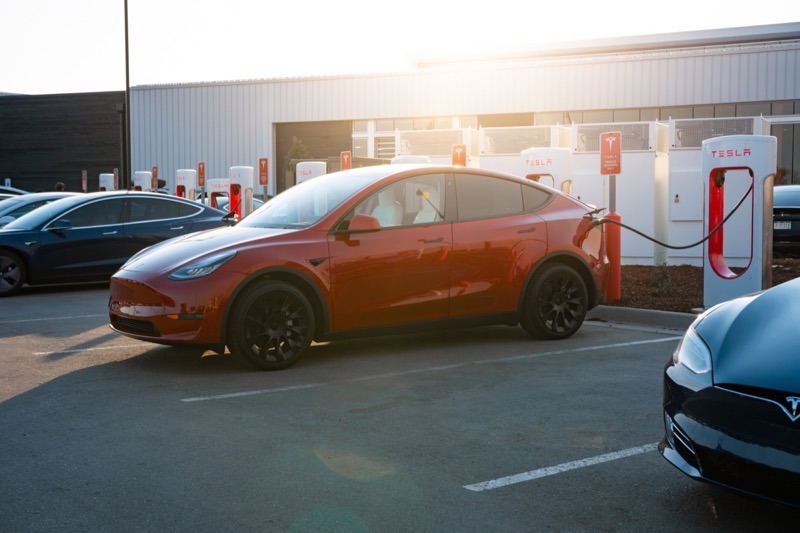Tesla, the renowned electric vehicle manufacturer, is gearing up to launch its first Supercharger station in India, marking a significant milestone for the company’s expansion into the Indian market. The Supercharger station is set to open on Monday, August 4, in Mumbai, specifically at the One BKC (Bandra Kurla Complex) area.
The Supercharger station will feature four V4 Supercharging stalls capable of delivering up to 250 kW peak DC charging speeds, along with four Destination Charging stalls offering 11 kW AC charging. The pricing for charging at the station will be ₹24 ($0.28 USD) per kWh for Supercharging and ₹11 ($0.13 USD) per kWh for Destination Charging, providing competitive rates for EV owners in the region.
Tesla has highlighted that the new Superchargers will enable the Model Y to gain up to 267 km of range in just 15 minutes, which is sufficient for five round trips between Mumbai’s Chhatrapati Shivaji Maharaj International Airport and the Gateway of India. The Supercharger station will be seamlessly integrated into the Tesla app, allowing users to check availability, monitor charging progress, and handle payments with ease.
This launch comes shortly after Tesla’s entry into the Indian market with its first showroom, known as a Tesla Experience Center, also located in Mumbai. The company is further expanding its presence in India by preparing to open its second Experience Center in Delhi later this month, demonstrating its commitment to establishing a strong foothold in one of the world’s fastest-growing EV markets.
Currently, Tesla’s offerings in India are limited to the Model Y, available in standard RWD and Long Range RWD variants. The pricing for the base model starts at ₹5,989,000 (around $68,700 USD), while the Long Range version is priced at ₹6,789,000 (around $77,800 USD). The rear-wheel drive Model Y is equipped with a single electric motor generating approximately 295 hp, with battery pack options of 60 kWh and 75 kWh. The Long Range model boasts a WLTP-rated range of up to 622 km on a full charge.
With the inauguration of its first Supercharger station in India and the establishment of its initial showroom in the region, Tesla is poised to revolutionize the electric vehicle landscape in India. As the company continues to expand its infrastructure and offerings in the country, the future of sustainable transportation looks brighter than ever. The recent advancements in artificial intelligence have revolutionized the way we live and work. From self-driving cars to virtual assistants, AI technology is reshaping industries and improving efficiency in ways we never thought possible. One area where AI has made a significant impact is in healthcare.
The use of AI in healthcare has the potential to transform how medical professionals diagnose and treat patients. One of the key benefits of AI in healthcare is its ability to analyze vast amounts of data quickly and accurately. This means that doctors can make more informed decisions based on the latest research and patient data.
AI-powered diagnostic tools are already being used to detect diseases and conditions at earlier stages, leading to better outcomes for patients. For example, AI algorithms can analyze medical images such as X-rays and MRIs to identify abnormalities that may be missed by human eyes. This early detection can help doctors intervene sooner and provide more effective treatment options.
In addition to diagnosis, AI is also being used to personalize treatment plans for patients. By analyzing a patient’s medical history, genetic makeup, and lifestyle factors, AI algorithms can recommend tailored treatment options that are more likely to be effective. This personalized approach to medicine has the potential to improve patient outcomes and reduce healthcare costs in the long run.
Another area where AI is making a difference in healthcare is in predictive analytics. By analyzing patient data and trends, AI algorithms can predict which patients are at risk of developing certain conditions or complications. This information can help healthcare providers intervene early and prevent serious health issues from occurring.
Overall, the use of AI in healthcare has the potential to revolutionize the industry and improve patient care. By harnessing the power of artificial intelligence, doctors and healthcare professionals can make more accurate diagnoses, provide personalized treatment plans, and prevent health problems before they escalate. As AI technology continues to advance, we can expect to see even more exciting developments in the field of healthcare.

